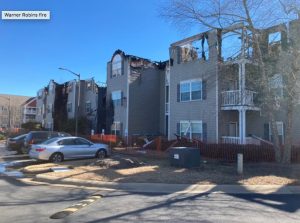
Sheena Shumate Tragically Loses Life in Warner Robins, GA Apartment Complex Fire. (41NBC.com)
Could the death from this apartment complex fire have been prevented and are justice and compensation available to the victim’s family? Read Our Legal Take below to find out what legal options are available.
Local News
A fire engulfed a Warner Robins, Georgia apartment complex early Sunday morning, January 17, 2021, leaving one person dead and multiple units damaged.
As reported by 41NBC.com, “the fire happened just after 2:00 Sunday morning at…Apartments on South Corder Road.”
According to the report, “Firefighters…were able to get most of the residents out of the building, but after extinguishing the fire they found one person dead inside.”
13WMAZ.com is reporting, “Houston County Coroner…identified the victim as 77-year-old Sheena Shumate.”
The cause of the fire is still under investigation.
Our Legal Take
As authorities continue their investigation, premises liability attorneys with The Murray Law Firm question whether a lack of fire safety measures at the complex may have contributed to this incident.
- What fire safety measures, such as working smoke detectors, fire sprinklers and emergency exits, were in place and working at the time of the fire?
- When was the last fire inspection performed on the property?
- Were any safety measures required to be added after any previous fire inspections?
As details of this fire continue to emerge, The Murray Law Firm suggests that it is possible that the property owner or management failed to undertake proper safety measures to protect those residents and guests legally on the premises. Under certain State law, the owner and management company of an apartment complex have a duty to protect residents and to keep the premises safe. If the owner or manager fails in this duty, they may be held civilly liable for any injuries or wrongful deaths that occur as a consequence. Should the complex be found at fault, the family of Sheena Shumate may elect to hold the owner or management company civilly liable for their loss and suffering. Financial recovery for such a claim could be substantial.
As insurance companies and unscrupulous property owners are often more concerned with limiting their financial exposure in these incidents, it is crucial that the family of Sheena Shumate retain an experienced premises liability firm as soon as possible to ensure all evidence, such as a faulty fire alarm or a poor evacuation plan, is preserved and their best interests are protected. The Murray Law Firm has extensive experience in premises liability and apartment negligence cases, such as this, and we offer our legal expertise, if needed.
If anyone has information to share, or if anyone is seeking information regarding this incident, please contact us at 478.246.1010.
Our Results
The Murray Law Firm has obtained over $100 million dollars for its Clients, and recently secured a $29.25 million dollar verdict for a fire victim at an unsafe property.
We represent our Clients on a contingency agreement, which generally means that no fees or payments are owed until and unless we recover. Anyone seeking further information or legal representation is encouraged to contact us via e-mail (click here) or by telephone at CALL NOW: 478.246.1010. Consultations are free and confidential.
Choosing the Right Attorney (CLICK HERE)
 Georgia Legal Report
Georgia Legal Report


